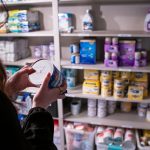Some of the most vulnerable babies are in need of breast milk donations.
Milk banks, many of which collect and distribute breast milk to newborns facing health challenges told Bloomberg News this month that they are running desperately low.
Breast milk contains a unique mix of vitamins, minerals, enzymes and other essentials that help protect newborns, particularly more vulnerable babies, from diseases and infections. The decrease in milk donations comes as parts of the country experience shortages in formula and baby food. With adequate food supply decreasing and demand rising, the situation has become more concerning for milk banks.
“Now more than ever, the need is up,” said Lindsay Groff, executive director of the Human Milk Banking Association of North America. “Only lactating people can do it and the window of time is short, which makes it even more precious.”
The 19th spoke with several experts about the factors contributing to the decrease in donor milk supply and how people can help.
-
Share your story with us:
-
Share your story with us: Parents: How has the baby formula shortage affected you?
What is a milk bank, and who might need one?
It’s a concept similar to donating blood or donating eggs for in vitro fertilization. People with more breast milk than they need for their own baby can donate it to help parents who are unable to produce an adequate supply themselves. Milk banks can be nonprofit or for-profit, which affects the prices they charge.
Donations are most commonly prioritized for ill or preterm babies who are in critical and immediate need of nutrients from human milk. For infants born preterm — before 37 weeks gestation — oftentimes the parent’s body is not yet ready to produce the amount of milk needed to sustain their child’s caloric needs. Donor milk can act as a bridge until the parent can produce more.
Breast milk, more than formula, can reduce preterm infants’ risk of necrotizing enterocolitis, a potentially life-threatening gastrointestinal disease, said Lynnette Hafken, a board certified lactation consultant and director of support services for the Fed is Best Foundation, which seeks to provide safe infant-feeding information to parents and healthcare providers. Necrotizing enterocolitis affects about 1 in 1,000 preterm babies and 1 in 10,000 full-term babies, according to the Cleveland Clinic.
Preterm births are more concerning for certain racial and socioeconomic groups. In 2020, the rate of preterm birth among Black women was 14.4 percent, which is about 50 percent higher than the rate of preterm birth among White women (9.1 percent) or Latinas, who saw a rate of 9.8 percent, according to the Centers for Disease Control and Prevention.
Why are milk donations decreasing?
At the beginning of the pandemic, milk banks around the country braced themselves for a drop in donations. The opposite happened. The Human Milk Banking Association of North America (HMBANA) recorded a 13 percent increase in milk donations in 2020.
“We had a ton of donations in the early pandemic,” Groff said. “Parents were home, and we were all in lockdown, and when you’re in proximity with your baby you make more milk and also you’re feeding on demand.”
Groff suspects that a combination of factors has prompted donations to plunge and demand to jump this year, though HMBANA is still a few weeks away from sharing exact figures . With more people returning to work in person, lactating people may have fewer resources or opportunities to pump milk as frequently, which means fewer donations. And after nearly two years, people are more worn down from dealing with the pandemic, which may affect their time and ability to donate milk. At the same time, the pandemic’s disruption to global supply chains has affected the availability of formula, so people who would be buying formula are now seeking human milk donations.
“I don’t want to scare people, but we are in high need. If you’re ever going to step up to donate, now is the time,” Groff said.
How do milk donations work?
Before donating, lactating people should check with their doctor to make sure they are able to donate milk safely and have what they need for their own baby. They can then contact a local milk bank, or find one that serves regions of the country. HMBANA has 31 member nonprofit milk banks in the United States and Canada that are accredited based on safety.
The first step is a verbal screening where a representative would ask lifestyle or health questions about smoking, drug use and other things that can be transferred into the milk. They are also given a viral antibody test for HIV, hepatitis B and C, and syphilis.
Once past the screenings, donors can either take their milk to their nearby bank, or package it up according to the guidelines they’ve received for shipping. According to HMBANA, milk can not be donated if it has been heated in any way by the donor, and it can be stored in the refrigerator for a maximum of 96 hours before being moved to the freezer for long-term storage. Milk expires one year from the date of collection.
At the bank, donated milk is pooled together, pasteurized to eliminate bacteria and dispensed. Priority is typically given to the babies most in need, either directly or through a hospital.
How can I receive milk?
Hospital clinicians or other healthcare professionals should be able to provide information about donor milk options. Some hospitals have their own banks to distribute milk. If not, they can help with contacting one. Costs to receive will vary depending on whether the family has insurance and what a specific plan may cover. Price estimates range between $3 and $5 an ounce.
These costs, in addition to the limited location of milk banks, can be barriers for low-income people or those outside of major metropolitan areas, said Whitney Dula, an international board-certified lactation consultant. There also tends to be less access to and education about milk donor services in communities of color, she added. Some facilities like the Mothers’ Milk Bank of the Western Great Lakes, a HMBANA member, have worked to reduce costs and boost information about donor milk. Last year HMBANA received a $525,000 grant to improve its services to people of color.
“There are systemic, historical and structural issues that perpetuate inequity, affecting Black, Indigenous and people of color,” Groff said. “By examining the root causes and urging collective impact, we can improve health outcomes for infants and parents. Addressing equity will increase access to donor milk.”
Those unable to access a nonprofit bank also consider peer milk sharing, Dula said, an informal process of families working together to meet their babies’ nutrient needs. There are Facebook groups and other online communities built to connect people for milk sharing. People should be especially cautious about contamination risk during the collection, storage and transport of milk if they elect to try informal sharing, Hafken said.
“It’s not like there is one absolutely 110 percent safe form of feeding, but most medical organizations discourage informal milk sharing,” Hafken said.
When it comes to choosing breast milk versus formula, Hafken and her colleagues at the Fed is Best Foundation support how people choose to feed their newborns, but also hope to destigmatize formula use. While human milk is especially recommended for preterm babies, formula is a safe and nutritious supplement for full-term babies whose parents cannot breastfeed.
What are the risks of COVID-19 when milk-sharing?
The uncertainty of the pandemic and how it affects breast milk may make some parents nervous about donating or receiving donations. Researchers have found that the pasteurization process kills coronavirus. Additionally, the helpful antibodies that develop from either having the virus or the vaccine can be passed along in breast milk; however, it remains unclear how much protection milk with antibodies can shield breastfeeding babies or how much pasteurization reduces the effectiveness of antibodies.






